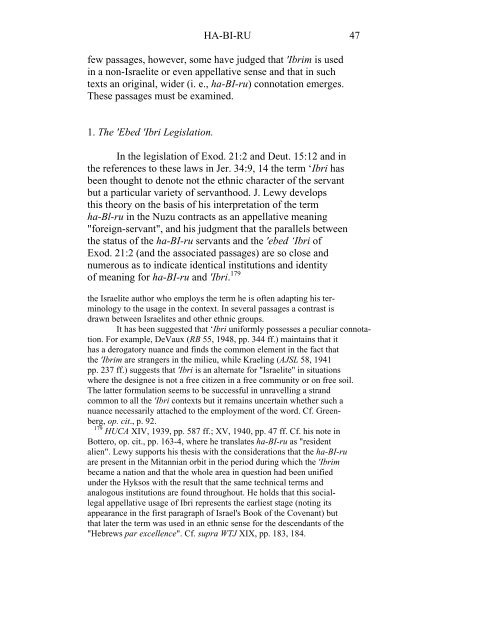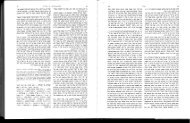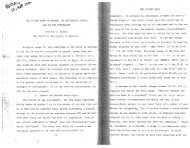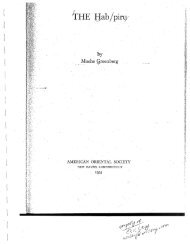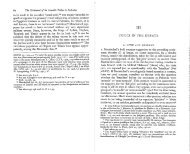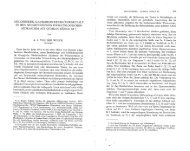The Ha-Bi-Ru--Kin or Foe of Israel? - Gordon College Faculty
The Ha-Bi-Ru--Kin or Foe of Israel? - Gordon College Faculty
The Ha-Bi-Ru--Kin or Foe of Israel? - Gordon College Faculty
You also want an ePaper? Increase the reach of your titles
YUMPU automatically turns print PDFs into web optimized ePapers that Google loves.
HA-BI-RU 47<br />
few passages, however, some have judged that 'Ibrim is used<br />
in a non-<strong>Israel</strong>ite <strong>or</strong> even appellative sense and that in such<br />
texts an <strong>or</strong>iginal, wider (i. e., ha-BI-ru) connotation emerges.<br />
<strong>The</strong>se passages must be examined.<br />
1. <strong>The</strong> 'Ebed 'Ibri Legislation.<br />
In the legislation <strong>of</strong> Exod. 21:2 and Deut. 15:12 and in<br />
the references to these laws in Jer. 34:9, 14 the term ‘Ibri has<br />
been thought to denote not the ethnic character <strong>of</strong> the servant<br />
but a particular variety <strong>of</strong> servanthood. J. Lewy develops<br />
this the<strong>or</strong>y on the basis <strong>of</strong> his interpretation <strong>of</strong> the term<br />
ha-Bl-ru in the Nuzu contracts as an appellative meaning<br />
"f<strong>or</strong>eign-servant", and his judgment that the parallels between<br />
the status <strong>of</strong> the ha-BI-ru servants and the 'ebed ‘Ibri <strong>of</strong><br />
Exod. 21:2 (and the associated passages) are so close and<br />
numerous as to indicate identical institutions and identity<br />
<strong>of</strong> meaning f<strong>or</strong> ha-BI-ru and 'Ibri. 179<br />
the <strong>Israel</strong>ite auth<strong>or</strong> who employs the term he is <strong>of</strong>ten adapting his ter-<br />
minology to the usage in the context. In several passages a contrast is<br />
drawn between <strong>Israel</strong>ites and other ethnic groups.<br />
It has been suggested that ‘Ibri unif<strong>or</strong>mly possesses a peculiar connota-<br />
tion. F<strong>or</strong> example, DeVaux (RB 55, 1948, pp. 344 ff.) maintains that it<br />
has a derogat<strong>or</strong>y nuance and finds the common element in the fact that<br />
the 'Ibrim are strangers in the milieu, while Kraeling (AJSL 58, 1941<br />
pp. 237 ff.) suggests that 'Ibri is an alternate f<strong>or</strong> "<strong>Israel</strong>ite" in situations<br />
where the designee is not a free citizen in a free community <strong>or</strong> on free soil.<br />
<strong>The</strong> latter f<strong>or</strong>mulation seems to be successful in unravelling a strand<br />
common to all the 'Ibri contexts but it remains uncertain whether such a<br />
nuance necessarily attached to the employment <strong>of</strong> the w<strong>or</strong>d. Cf. Green-<br />
berg, op. cit., p. 92.<br />
179 HUCA XIV, 1939, pp. 587 ff.; XV, 1940, pp. 47 ff. Cf. his note in<br />
Bottero, op. cit., pp. 163-4, where he translates ha-BI-ru as "resident<br />
alien". Lewy supp<strong>or</strong>ts his thesis with the considerations that the ha-BI-ru<br />
are present in the Mitannian <strong>or</strong>bit in the period during which the 'Ibrim<br />
became a nation and that the whole area in question had been unified<br />
under the Hyksos with the result that the same technical terms and<br />
analogous institutions are found throughout. He holds that this social-<br />
legal appellative usage <strong>of</strong> Ibri represents the earliest stage (noting its<br />
appearance in the first paragraph <strong>of</strong> <strong>Israel</strong>'s Book <strong>of</strong> the Covenant) but<br />
that later the term was used in an ethnic sense f<strong>or</strong> the descendants <strong>of</strong> the<br />
"Hebrews par excellence". Cf. supra WTJ XIX, pp. 183, 184.


